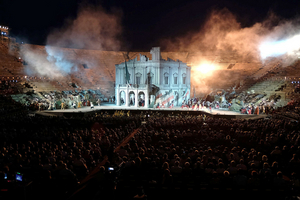Review: NABUCCO, Marquee TV

![]() For anyone lucky enough to have seen a performance at the beautiful Arena di Verona will know that out of the thousands of seats, very few are actually comfortable. Three hours sitting on stone steps with no back support will test the most ardent Verdi fan, but luckily Marquee TV have now debuted an impressive production of his Nabucco on their platform.
For anyone lucky enough to have seen a performance at the beautiful Arena di Verona will know that out of the thousands of seats, very few are actually comfortable. Three hours sitting on stone steps with no back support will test the most ardent Verdi fan, but luckily Marquee TV have now debuted an impressive production of his Nabucco on their platform.
First performed in Milan in 1842, the opera was Verdi's first breakthrough, developed during turbulent time leading to the unification of Italy. Originally set in biblical times, Arnaud Bernard's lavish and intelligent production takes us back to the heart of the political uprisings of 1848 and the La Scala opera house itself that is putting on a production of Nabucco. Nabucco himself becomes Franz Joseph I and the Hebrews are now the Italians wanting independence. It is an idea that works well and does not feel gimmicky.
The Chorus of the Hebrew Slaves, also known as 'Va Pensiero', is an unofficial national anthem in Italy; the nation identifying with the plight of the Hebrews as they longed for their own land to be restored during Austrian rule. It is nostalgic and put Verdi on the map as a revolutionary composer who captured the national mood. In this production it is as emotionally charged as ever, with an all-encompassing legato that is the highlight of this production. If you happen to be Italian, this will feel something like the Last Night of the Proms in terms of feeling national pride and unity.
This performance contains some very good singers, occasionally slipping into overacting. This is perfectly normal in huge stadium productions, as the space is so huge. George Gagnidze is brusque and suitably unsympathetic as Nabucco, his baritone solid and controlled. His performance of the big aria 'Dio di Guida' is beautifully pitched and full of emotion. The calabetta that follows is strong and shows a demonstrable character arc as he moves from tenderness to strength.
Rome-born Susanna Branchini is excellent as Abigaille, Nabucco's military general who betrays him to take the side of the Italians. Her soprano is almost flawless and must have been spine-tingling to hear in the arena itself. Branchini immerses herself in the character and she portrays a real mix of emotions; from fury to loneliness and sorrow.
Rafa Siwek is a solid leader of the revolutionaries as Zaccaria, showing assured bass notes and the impression of a fearless warrior. Fenena and Ismaele seem smaller roles here as the focus is very much more on the battle for Italian independence. Nevertheless, Georgian mezzo Nino Surguladze is wonderful as Fenena. Rubens Pelizzari's Ismaele is forceful and projects well.
Conductor Daniel Oren shows a driven performance in the pit, giving great heart to Verdi's huge score and pushing his singers to fill the huge stage. The orchestra of the Arena di Verona are on brilliant form, with precise and passionate playing.
The arena itself is huge and so direction for a small screen is challenging, but this production manages to convey both the vastness of the arena and stage, with a good focus on the details of the production.
Alessandro Camera's cleverly revolving set design is hugely detailed, particularly the interior of the La Scala opera house, which is built up onto numerous levels. This set erupts in the final scene with a highly effective use of enormous Italian flags being waved at every point on the stage and up the tiered steps behind.
This is not a traditional production of Nabucco by any means, but it is bold, loud, passionate, and very cleverly adapted.
Nabucco is now available on Marquee TV
Reader Reviews
Videos

